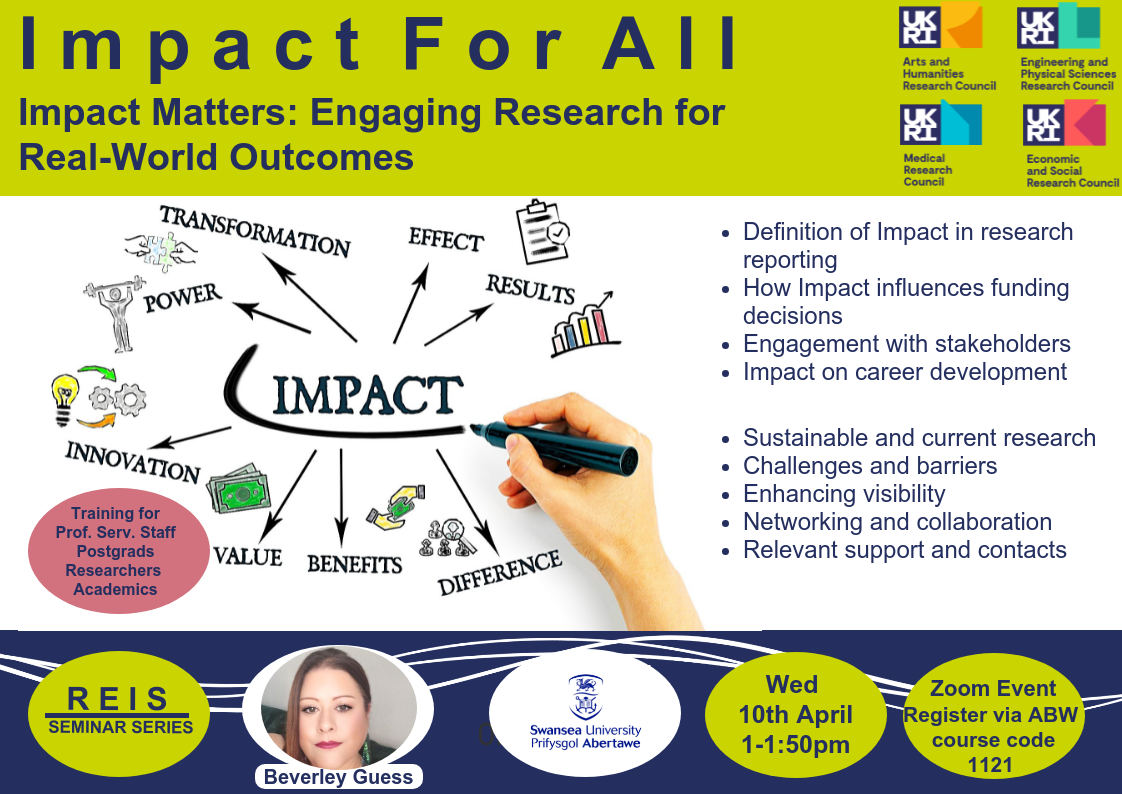
Registration is required
Register at: https://abw.swansea.ac.uk/BusinessWorld/
This event is part of the RKE Seminar Programme series
SpeakerBeverley Guess
Speaker's BiographyBeverley Guess, Impact Manager, Swansea University
With over two decades of experience at Swansea University, I have dedicated my career to enhancing the impact of academic research and fostering collaboration with external stakeholders across private, public, and third sector organisations.
Since joining Swansea University in 2003, I have focused on empowering academics and researchers to accelerate their impact, bridging the gap between innovative research and real-world application. My role involves managing a team of Impact and Engagement Officers across the three Faculties and project managing four UKRI Impact Acceleration Accounts, where I facilitate partnerships that drive meaningful change and support research initiatives.
As a qualified APMG Change Manager, I am skilled in navigating complex projects and implementing effective strategies that promote sustainable impact. My passion lies in connecting research with societal needs, ensuring that academic work contributes positively to communities and industries.
I am committed to creating synergies between academia and various sectors, helping to transform research into actionable outcomes that benefit society.
From: 10 Apr 2025, noonTo: 10 Apr 2025, 12:50 p.m.
Location: via Zoom. Link will be sent after registration on ABW - course code 1121, Online Event - Please see description
New IAA funded programme of research staff training
1. Introduction to Research Impact
- Definition of Impact: What "impact" means in the context of research (e.g., social, economic, environmental).
- Types of Impact: Distinguish between academic impact and real-world impact.
2. Importance of Impact in Securing External Funds
- Funding Landscape: Overview of how funding bodies evaluate research proposals.
- Impact Statements: Discuss the requirement for impact statements in grant applications.
3. Delivering Impact: Strategies and Approaches
- Engagement with Stakeholders
- Translational Research
- Knowledge Exchange
4. Impact on Career Development
- Professional Growth: focusing on impact can enhance career prospects and job satisfaction.
- Networking Opportunities: the role of impact-focused research in building professional networks.
- Skill Development: Highlight skills gained through engaging with stakeholders and communicating research effectively.
5. Keeping Research Current and Sustainable
- Relevance of Research: focusing on impact helps ensure research is addressing current societal needs.
- Visibility and Accessibility: Explore strategies for making research more discoverable (e.g., open access, media engagement, social media).
- Use of Metrics: Introduce tools and metrics for measuring impact and how they can be used to enhance visibility.
6. Challenges and Barriers
- Common Challenges: Looking at barriers researchers face in delivering impactful research (e.g., time constraints, lack of resources).
- Overcoming Challenges: Understanding support mechanisms at Swansea University for overcoming these barriers.
Learning Outcomes:
1. Understanding Impact: Participants will be able to define what research impact means and identify its various forms (e.g., social, economic, environmental).
2. Navigating Funding Opportunities: Participants will understand how impact influences funding decisions and will be able to articulate the components of a strong impact statement for grant applications.
3. Strategies for Engagement: Participants will learn effective strategies for engaging with stakeholders, including community members, policymakers, and industry partners, to enhance the relevance of their research.
4. Translating Research to Practice: Participants will be able to identify methods for translating their research findings into practice and communicating them to non-academic audiences.
5. Career Development Insights: Participants will recognise the role of impactful research in career advancement and will be able to identify ways to leverage their research for professional growth.
6. Enhancing Visibility: Participants will learn how to make their research more discoverable and accessible to a wider audience, thereby increasing its potential impact.
7. Addressing Challenges: Participants will identify common challenges in delivering impactful research and will develop strategies to overcome these barriers.
8. Reflective Practice: Participants will engage in reflective practice to assess how they can integrate impact into their own research agendas and career paths.
9. Networking and Collaboration: Participants will understand the importance of building networks and collaborative relationships to enhance the impact of their research.
10. Supporting the Impact Journey: Participants will receive an update on who can support them on their own personal impact journey at Swansea University and learn about our “Impact for All” training and development.
Contact: Beverley Guess (Email: B.M.Guess@Swansea.ac.uk)
Event created by: t.m.chambers
